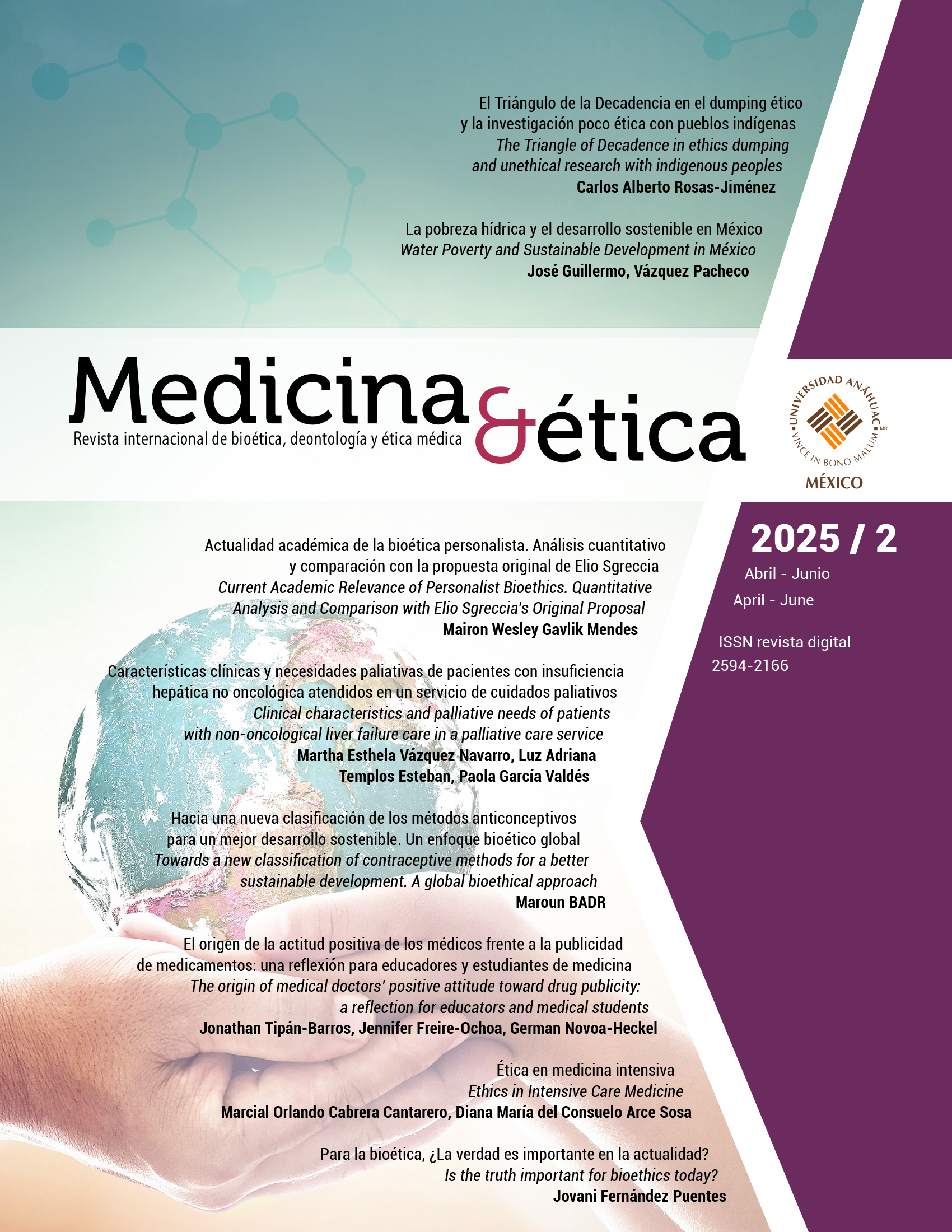Water Poverty and Sustainable Development in México
Main Article Content
Abstract
Sustainable development is a priority objective in contemporary societies. In this context, the un has established clear limits for the ecological footprint of countries. Mexico, with moderate and extreme water poverty levels, obtained a score of 57/100 points, positioning it as one of the most polluting countries in the world and moving away from the goals of the 2030 Agenda. This scenario requires nations, especially developed ones, to be more responsible in their investments in developing countries. The implementation of innovative technologies for water supply and sanitation, aligned with un proposals, is crucial to move towards a sustainable future and meet global commitments.
Downloads
PLUMX Metrics
Article Details

This work is licensed under a Creative Commons Attribution-NonCommercial-ShareAlike 4.0 International License.
Medicina y Ética is distributed under a Creative Commons License Atribución-NoComercial-CompartirIgual 4.0 Internacional.
The author keeps the property rights with no restriction whatsoever and guarantees the magazine the right to be the first publication of the work. The author is free to deposit the published version in any other medium, such as an institutional archive or on his own website.
References
Albornoz Mendoza L, Ortiz Pech R, Canto Sáenz R. La insostenibilidad del desarrollo en las entidades federativas de México. Ensayos [Internet]. 2020 [citado 27 de diciembre de 2024]; 39(1):59-86. Disponible en: https://ensayos.uanl.mx/index.php/ensayos/article/view/142 DOI: https://doi.org/10.29105/ensayos39.1-3a
Olivas M, Camberos M. El índice de pobreza hídrica para México: una comparación con países de la OECD. Entre ciencia e ingeniería. 2021; 15(29):54–62. https://doi.org/10.31908/19098367.1848 DOI: https://doi.org/10.31908/19098367.1848
Ayllon J, Omaña J, Sangerman-Jarquín M, Martínez M, Matus J, González F. Variación porcentual del INPC, canasta alimentaria y salario mínimo en México, enero 2002 junio 2020. Rev Mex De Cienc Agric. 2021; 12(5):875–84. https://doi.org/10.29312/remexca.v12i5.2991 DOI: https://doi.org/10.29312/remexca.v12i5.2991
Dorn F, Radice R, Marra G, Kneib T. A bivariate relative poverty line for leisure time and income poverty: Detecting intersectional differences using distributional copulas. Review of Income and Wealth. 2024; 70(2): 395-419. https://doi.org/10.1111/roiw.12635 DOI: https://doi.org/10.1111/roiw.12635
Barrera M, Galván E, Marín L, Pérez R. Análisis comparativo de la pobreza en las fronteras de México: aplicación del coeficiente de Engel. Equidad & Desarrollo [Internet]. 2020; (35):107-124. Disponible en: https://www.redalyc.org/articulo.oa?id=95779231005 DOI: https://doi.org/10.19052/eq.vol1.iss35.5
Garza-Rodriguez J. Poverty and Economic Growth in Mexico. Social Sciences [Internet]. 2018; 7(10):183. Disponible en: https://www.mdpi.com/2076-0760/7/10/183 DOI: https://doi.org/10.3390/socsci7100183
Kurjenoja A. Urban Modeling in the Global South and Sustainable Socio-Territorial Development: Case of Puebla-San Andrés Cholula Urban Binomial, Mexico. Land (Basel). 2023; 12(11). https://doi.org/10.3390/land12112081 DOI: https://doi.org/10.3390/land12112081
Gobierno de México. Informe sobre la situación actual en Puebla [Internet]. México: Gobierno de México; [citado 2024 nov 4]. Disponible en: https://www.gob.mx/cms/uploads/attachment/file/696550/21_PUE.pdf
Rodríguez-Tapia L, Morales-Novelo JA, Zavala-Vargas P. Evaluación socioeconómica de daños ambientales por contaminación del río Atoyac en México. Tecnol. cienc. agua [Internet]. 2012; 3:143-51. Disponible en: https://revistatyca.org.mx/index.php/tyca/article/view/2208
Soto G, Ramírez A. Value of river restoration when living near and far. The Atoyac Basin in Puebla, Mexico / Valor de la restauración de ríos cuando se vive cerca y lejos. La Cuenca de Atoyac en Puebla, México. Tecnol. cienc. agua [Internet]. 2019; 10(1):177-206. Disponible en: https://orcid.org/0000-0002-6370-2136 DOI: https://doi.org/10.24850/j-tyca-2019-01-07
Santa María Torres DJ, López Álvarez B. Cálculo del índice de pobreza del agua en la Zona Media de San Luis Potosí. Revista de El Colegio de San Luis. 2020; 10(21):1–28. https://doi.org/10.21696/rcsl102120201176 DOI: https://doi.org/10.21696/rcsl102120201176
Magar V, Peña A, Hahmann A, Pacheco-Rojas D, García-Hernández L, Gross M. Wind Energy and the Energy Transition: Challenges and Opportunities for Mexico. Sustainability (Switzerland). 2023; 15(6). https://doi.org/10.3390/su15065496 DOI: https://doi.org/10.3390/su15065496
Gleick PH, Cooley H. Freshwater Scarcity. Annu Rev Environ Resour. 2021; 46:319–48. https://doi.org/10.1146/annurev-environ-012220-101319 DOI: https://doi.org/10.1146/annurev-environ-012220-101319
Alper AE, Alper FO, Cil AB, Iscan E, Eren AA. Stochastic convergence of ecological footprint: new insights from a unit root test based on smooth transitions and nonlinear adjustment. Environmental Science and Pollution Research. 2023; 30(8):22100–14. https://doi.org/10.1007/s11356-022-23763-6 DOI: https://doi.org/10.1007/s11356-022-23763-6
Eren A, Alper F. Persistence of Policy Shocks to the Ecological Footprint of MINT Countries. Ege Akademik Bakis (Ege Academic Review). 202; 427–40. https://doi.org/10.21121/eab.1015635 DOI: https://doi.org/10.21121/eab.1015635
Eweade BS, Karlilar S, Pata UK, Adeshola I, Olaifa JO. Examining the asymmetric effects of fossil fuel consumption, foreign direct investment, and globalization on ecological footprint in Mexico. Sustainable Development. 2023. https://doi.org/10.1002/sd.2825 DOI: https://doi.org/10.1002/sd.2825
Zhang L, Xu M, Chen H, Li Y, Chen S. Globalization, Green Economy and Environmental Challenges: State of the Art Review for Practical Implications. Front Environ Sci. 2022; 10. https://doi.org/10.3389/fenvs.2022.870271 DOI: https://doi.org/10.3389/fenvs.2022.870271
Destek MA, Sarkodie SA. Investigation of environmental Kuznets curve for ecological footprint: The role of energy and financial development. Science of the Total Environment. 2019; 650:2483–9. https://doi.org/10.1016/j.scitotenv.2018.10.017 DOI: https://doi.org/10.1016/j.scitotenv.2018.10.017
Leal W, Wolf F, Lange A, Beynaghi A, Shulla K, Kovaleva M. Heading towards an unsustainable world: some of the implications of not achieving the SDGs. Disco- ver Sustainability. 2020; 41(1):2. https://doi.org/10.1007/s43621-020-00002-x DOI: https://doi.org/10.1007/s43621-020-00002-x
Lizardi C. On the Precedence of Constraints on Growth: Advocating the Ecological Footprint Perspective. Revista Mexicana de Economía y Finanzas, Nueva Época. 2021; 16(4). https://doi.org/10.21919/remef.v16i4.619 DOI: https://doi.org/10.21919/remef.v16i4.619
Gómez M, Rodríguez J. The ecological footprint and Kuznets environmental curve in the USMCA countries: A method of moments Quantile regression analysis. Energies (Basel). 2020; 13(24). https://doi.org/10.3390/en13246650 DOI: https://doi.org/10.3390/en13246650
Paravantis J, Tasios P, Dourmas V, Andreakos G, Velaoras K, Kontoulis N, Mihalakakou P. A Regression Analysis of the Carbon Footprint of Megacities. Sustaina- bility. 2021; 13(3):1379. https://doi.org/10.3390/su13031379 DOI: https://doi.org/10.3390/su13031379
Nuñez-Espinoza J, Gómez-Rigalt R. Structural breviary about the social construction of scientific water knowledge at Mexico: An approach [Breviario estructural sobre la construcción social del conocimiento científico hídrico en México: una aproximación]. Tecnología y Ciencias del Agua. 2022; 13(3):293–373. https://doi.org/10.24850/j-tyca-2022-03-07 DOI: https://doi.org/10.24850/j-tyca-2022-03-07
Daniela-Abigail HL, Tariq R, Mekaoui A El, Bassam A, Vega De Lille M, J Ricalde L. Does recycling solar panels make this renewable resource sustainable? Evidence supported by environmental, economic, and social dimensions. Sustain Cities Soc. 2022; 77:103539. https://doi.org/10.1016/j.scs.2021.103539 DOI: https://doi.org/10.1016/j.scs.2021.103539
McBean G. Integrating science to address food and health within Global Agenda 2030. NPJ Sci Food. 2021; 5(1). https://doi.org/10.1038/s41538-021-00088-1 DOI: https://doi.org/10.1038/s41538-021-00088-1
Fischer J, Riechers M, Loos J, Martin-Lopez B, Temperton VM. Making the UN Decade on Ecosystem Restoration a Social-Ecological Endeavour. Trends Ecol Evol. 2021; 36(1):20–8. https://doi.org/10.1016/j.tree.2020.08.018 DOI: https://doi.org/10.1016/j.tree.2020.08.018

